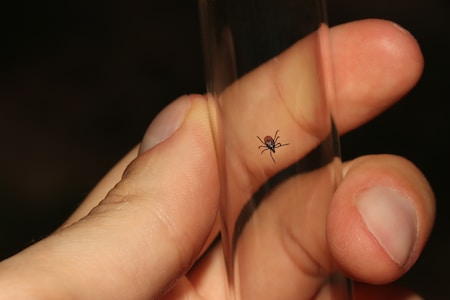Lyme disease is a bacterial infection caused by the Borrelia burgdorferi bacteria, which is transmitted to humans through the bite of an infected tick.
While Lyme disease can cause a range of symptoms, including fever, fatigue, joint pain, and headaches, hair loss is not commonly associated with the disease.
However, in rare cases, some individuals with Lyme disease may experience hair loss.
In this article, we’ll explore the relationship between Lyme disease and hair loss and discuss the various factors that can contribute to hair loss in Lyme disease.
What is Lyme disease and how is it transmitted to humans?
Lyme disease is a bacterial infection that is transmitted to humans through the bite of an infected tick, typically the black-legged tick (Ixodes scapularis) in the northeastern and upper midwestern regions of the United States.
The Borrelia burgdorferi bacterium can enter the bloodstream and cause a range of symptoms, including fever, fatigue, and joint pain.
What are the common symptoms of Lyme disease and how does it affect the body?

The symptoms of Lyme disease can vary from person to person, and some individuals may not experience any symptoms at all.
However, the most common symptoms include fever, fatigue, joint pain, headaches, and a characteristic skin rash known as erythema migrans.
Lyme disease can also affect other parts of the body, including the heart, nervous system, and joints.
Is hair loss a common symptom of Lyme disease?
While hair loss is not a common symptom of Lyme disease, it can occur in some individuals.
The severity of hair loss can vary, and it is not usually the primary symptom of the disease.
How does Lyme disease cause hair loss?
Hair loss in Lyme disease is thought to be caused by inflammation and damage to the hair follicles.
The severity of hair loss can vary depending on the extent of the infection and the individual’s immune response.
What are the other factors that can contribute to hair loss in Lyme disease?

Other factors that can contribute to hair loss in Lyme disease include stress, nutritional deficiencies, hormonal imbalances, and medication side effects.
If hair loss is observed in a patient with Lyme disease, it is essential to rule out other underlying causes such as thyroid disorders and autoimmune conditions.
How is hair loss in Lyme disease diagnosed and treated?
The diagnosis of hair loss in Lyme disease is based on a thorough medical history and physical examination.
Blood tests and scalp biopsies may also be performed to rule out other underlying conditions.
The treatment of hair loss in Lyme disease involves the management of the underlying infection and addressing any other contributing factors, such as stress or nutritional deficiencies.
Can antibiotics and other medications help to reverse hair loss caused by Lyme disease?
Antibiotics are the primary treatment for Lyme disease, and they may also help to resolve hair loss in some cases.
Topical medications such as minoxidil may also be prescribed to promote hair growth and combat hair loss caused by Lyme disease.
What nutritional supplements can be used to promote hair growth in Lyme disease?

Nutritional supplements such as biotin, iron, and zinc may also help to promote hair growth and prevent hair loss in Lyme disease.
A balanced and nutritious diet rich in vitamins and minerals can also help to support hair growth and prevent hair loss.
What role does stress management play in preventing hair loss in Lyme disease?
Stress management techniques such as meditation, yoga, and exercise may also help to reduce Box of Inspiration continue writing stress and prevent hair loss in Lyme disease.
Stress can contribute to hair loss by disrupting the normal hair growth cycle, and managing stress can help to maintain healthy hair growth.
How can emotional support be helpful for patients experiencing hair loss in Lyme disease?
Emotional support can be helpful for patients experiencing hair loss in Lyme disease.
Hair loss can be a distressing symptom that can affect a person’s self-esteem and quality of life.
Talking to a mental health professional or joining a support group can help individuals cope with the emotional impact of hair loss and improve their overall well-being.
What are the long-term complications of untreated Lyme disease?

If left untreated, Lyme disease can lead to a range of long-term complications, including chronic joint pain, neurological problems, and heart palpitations.
Early diagnosis and treatment are essential to prevent these complications from developing.
How can Lyme disease be prevented, and what precautions should be taken to avoid infection?
The best way to prevent Lyme disease is to avoid exposure to infected ticks.
This can be done by wearing protective clothing, using insect repellent, and avoiding areas where ticks are prevalent.
It’s also important to check for ticks after spending time outdoors and to promptly remove any ticks that are found.
Final Thought – Can Lyme Disease Cause Hair Loss?
While hair loss is not a common symptom of Lyme disease, it can occur in some individuals.
Hair loss in Lyme disease is thought to be caused by inflammation and damage to the hair follicles, as well as other contributing factors such as stress and nutritional deficiencies.
The management of hair loss in Lyme disease involves the treatment of the underlying infection and addressing any other contributing factors.
Disclaimer and Advice:
This article is for informational purposes only and is not intended to provide medical advice.
If you are experiencing hair loss or any other symptoms of Lyme disease, please consult with a healthcare professional for an accurate diagnosis and appropriate treatment.
Read More:
Marc Anthony Weight Loss: Achieving a Healthier Lifestyle in the Heights
Sarah Love After Lockup Weight Loss
Jelayne Shelton Weight Loss: Stunning Weight Loss Transformation
Can You Bleach Wet Hair? Know the Risks and Best Practices
Clomid Success Stories: A Ray of Hope for Women Struggling with Infertility

